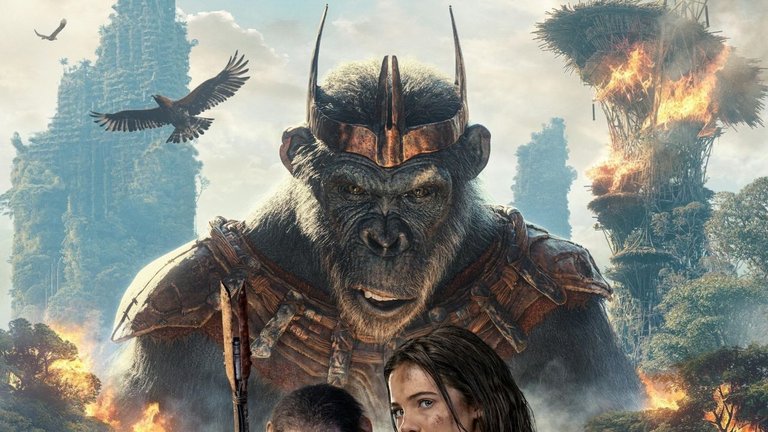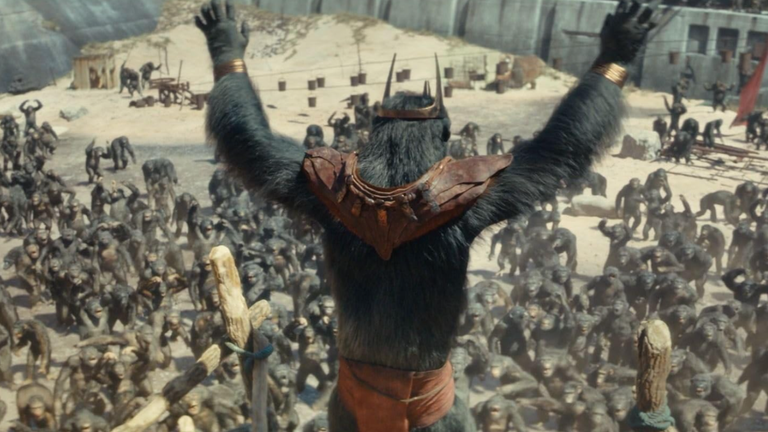Proximus - a well-written adversary in the film / Proximus - dobrze napisany przeciwnik w filmie

Yesterday, during a long, 3-hour conversation with my aunt on various topics, a certain topic came to my mind. I haven't noticed an interesting antagonist in popular cinema for a long time. Probably since Thanos in the memorable summary of the current part of the MCU. It is true that I praised the opponent of Kong and Godzilla in the new film, but he lacked one, or almost two, attributes that the hero of this text has. I say "almost" because it's hard to deny his intelligence, but then again, he's not as intelligent as Proximus.
It was no accident that I compared one to the other, it's hard to say that they are "simply bad". It's even harder to call them good, so let's assume they have a sensible plan that will improve the lives of a specific group of beings at the expense of some of them. Would you say this is bad? Agreed, but that's life. Examples - Alan Turing (the man who broke Enigma and is one of the fathers of modern computers) said that it is impossible to save everyone and sometimes you have to choose. Or the character played by Jared Leto in the latest film Blade Runner, saying that no big leap forward has come at the expense of any group of people (this is not an exact quote, because I couldn't find it on Google, but that was the point). Would you say it's fiction? Ok, so the development of AI and the development of technology that took away the jobs of many ordinary people (industrial revolution, introduction of the first agricultural machines), what is the difference between one and the other? Ok, it was a long time ago... So what about the miners, whose jobs and "some" comfort of life were taken away by Margaret Thatcher in order to save the economy of the whole of Great Britain? Apparently, to this day, you can still see people swearing or spitting (and often both) at the mention of the Iron Lady. It all depends on the perspective from which we look at the Bigger Picture or indicators in Excel.
Proximus is a dictator, isn't he? He's probably taking advantage of his people... Erm, sorry, monkeys. We don't know this because this issue was not explicitly shown in the film. And if someone says that it is visible in the poverty in which the monkeys live on the beach, I will counter it with the slogan - and how can they live if they built their city from nearby garbage and remains? The film makes it very clear that monkeys (and probably any creatures that could step into their shoes given the right circumstances) replicate human behavior or discover that the world works this way. In fact, monkeys understand it even better - we built cities and developed technology to defend ourselves against wild animals and bandits. The monkeys, on the other hand, had to learn how to live inside the wild. So Proximus introduced a hierarchy of people that probably depends on skill and intelligence - that's what several scenes and his hunger for knowledge suggest to us. He does not look at the origins of the ape or man, but only at what it can give him and his group of apes.
I just can't defend his attitude towards other tribes. This cannot actually be justified, but on the other hand, it is very difficult to create a strong, lasting state based on friendship and peace, as Caesar planned. More than one country in the history of the world has been defeated by a band of barbarians or opponents. Such as Koba, Caesar's opponent. Don't misunderstand that this is the only alternative to Proximus' rule! Yes, it is bad, but no matter how you look at it, it is an effective way to achieve the goal. Proximus reads books, is capable of abstract thinking and knows that the lack of technology greatly limits the possibilities of action. Likewise, there are no resources or slaves. I know that it's "cool" to be in the management group and "not cool" to be in the latter, but we're talking about a fictitious situation, so that's a different matter. Oh, what about modern slavery and the exploitation of legal workers from another country, which was an everyday occurrence when I lived in the UK (even English newspapers wrote about it)? Oh, you mustn't talk about it!

Don't get me wrong, I'm not saying he's a positive hero. As I wrote at the beginning, I am far from this statement. I just wanted to share my conclusions regarding the new antagonist of the series I like. It's a pity we won't see him again, because watching him on screen was pure pleasure. Unfortunately, it's the beginning of a new trilogy, so we had to devote time to other characters, showing the world after Ceaser, etc. They succeeded in terms of appearance (a very nice CGI model, you can see that they devoted the most time to it), character and overall creation. To this day, my girlfriend and I like to say "What a wonderful day!"

Wczoraj podczas długiej, 3-godzinnej rozmowy z ciocią na różne tematy, wpadł mi do głowy pewien temat. Od dawna nie zauważyłem ciekawego antagonisty w popularnym kinie. Chyba tak od czasów Thanosa w pamiętnym podsumowaniu dotychczasowej części MCU. Co prawda chwaliłem przeciwnika Konga i Godzilli w nowym filmie, ale brakowało mu jednego, no prawie dwóch atrybutów, które ma bohater tego tekstu. Mówię "prawie", bo trudno mu odmówić inteligencji, ale z drugiej strony, nie jest tak inteligentny, jak Proximus.
Nieprzypadkowo porównałem jednego do drugiego, trudno o nich powiedzieć że są "po prostu źli". Jeszcze trudniej jest ich nazwać dobrymi, więc przyjmijmy, że mają sensowny plan, który poprawi życie konkretnej grupie istot kosztem części z nich. Powiecie, że to złe? Zgoda, ale takie jest życie. Przykłady - Alan Turing (człowiek który złamał Enigmę i jest jednym z ojców współczesnych komputerów) powiedział, że nie da się uratować wszystkich i czasem trzeba wybrać. Albo bohater w którego wcielił się Jared Leto w najnowszym filmie Blade Runner, mówiąc że żaden duży skok do przodu nie odbył się kosztem jakieś grupy ludzi (nie jest to dokładny cytat, bo nie mogłem go znaleźć w Google, ale o to chodziło). Powiecie, że to fikcja? Ok, no to rozwój AI i rozwój technologii, który odebrał pracę wielu prostym ludziom (rewolucja przemysłowa, wprowadzenie pierwszych maszyn rolniczych), czym się jedno różni od drugiego? No ok, to było dawno... Zatem co z górnikami, którym Margaret Thatcher odebrała pracę i "jakiś tam" komfort życia, by ratować gospodarkę całej Wielkiej Brytanii? Podobno do dziś widać ludzi, którzy klą lub spluwają (a często i to i to) na wspomnienie o Żelaznej Damie. Wszystko zależy od tego, z jakiej perspektywy patrzymy na Bigger Picture lub wskaźniki w Excelu.
Proximus to dyktator, prawda. Prawdopodobnie wykorzystuje swoich ludzi... Erm, przepraszam, małpy. Nie wiemy tego, bo ta kwestia nie została wprost pokazana w filmie. A jeżeli ktoś powie, że widać to po biedzie, w jakiej żyją małpy na plaży, skontruję to hasłem - a jak mają żyć, jeżeli zbudowali swoje miasto z pobliskich śmieci i pozostałości? Film bardzo mocno daje nam do zrozumienia, że małpy (jak i prawdopodobnie dowolne istoty, które mogłyby wskoczyć na ich miejsce przy sprzyjających okolicznościach) powielają zachowania ludzi lub odkrywają, że świat działa tak, a nie inaczej. W sumie to małpy to nawet lepiej rozumieją - my zbudowaliśmy miasta, rozwinęliśmy technologię, by się bronić przed dzikimi zwierzętami, czy bandytami. Małpy natomiast musiały się nauczyć, jak żyć wewnątrz dzikiej natury. Zatem Proximus wprowadził hierarchię ludzi, która prawdopodobnie zależy od umiejętności i inteligencji - tak nam sugeruje kilka scen i jego głód do wiedzy. Nie patrzy na pochodzenie małpy lub człowieka, tylko na to, co może dać jemu i grupie jego małp.
Nie mogę jedynie obronić jego postawy wobec innych plemion. Tego faktycznie nie można uzasadnić, ale z drugiej strony, bardzo trudno jest stworzyć silne, trwałe państwo oparte na przyjaźni i pokoju, jak to planował Caesar. Nie jedno państwo w historii świata zostało pokonane przez bandę barbarzyńców lub przeciwników. Takich jak choćby Koba, przeciwnik Caesara. Nie rozumcie tego, że to jedyna alternatywa wobec rządów Proximusa! Tak, jest to złe, ale jakby na to nie patrzeć, to skuteczna droga do osiągnięcia celu. Proximus czyta książki, jest zdolny do abstrakcyjnego myślenia i wie, że brak technologii bardzo ogranicza możliwości działania. Tak samo brak zasobów, czy niewolników. Wiem, że "fajnie jest" być w grupie zarządzającej, zaś "nie fajnie" jest siedzieć w tej drugiej, ale rozmawiamy o fikcyjnej sytuacji, więc to inna sprawa. Och, a co z współczesnym niewolnictwem i wykorzystywaniem legalnych pracowników z innego kraju, co było codziennością jak mieszkałem w UK (nawet angielskie gazety o tym pisały)? Ach, nie wolno o tym mówić!

Nie zrozumcie mnie źle, nie mówię że to pozytywny bohater. Jak napisałem na początku, jestem daleki od tego twierdzenia. Chciałem się po prostu podzielić swoimi wnioskami w kwestii nowego antagonisty lubianej przeze mnie serii. Szkoda że nie zobaczymy go ponownie, bo oglądanie go na ekranie było czystą przyjemnością. Niestety to początek nowej trylogii, więc trzeba było poświęcić czas innym bohaterom, pokazaniu świata po Ceaserze itd. Udał im się w kwestii wyglądu (bardzo fajny model w CGI, widać że poświęcili mu najwięcej czasu), charakteru i ogólnej kreacji. Do dzisiaj lubimy sobie z dziewczyną mówić "What a wonderful day!"

